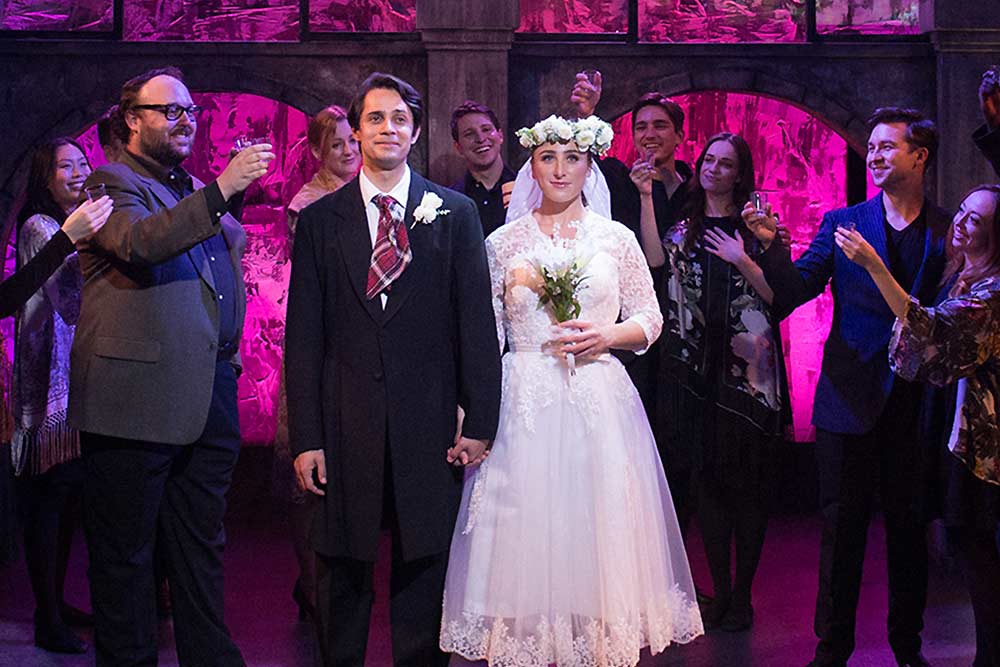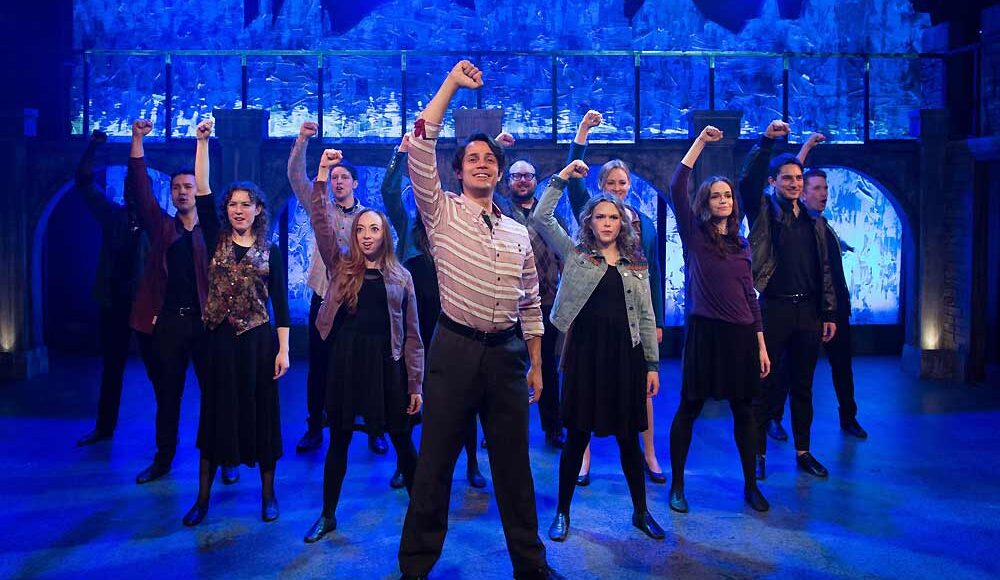By Ernest Kearney — “Singing Revolution the Musical,” at the Broadwater Main Stage, has so very much going for it that one is somewhat in awe of Director Tony Spinosa – who also composed the music and, in partnership with James Bearhart, provided the lyrics and wrote the book.
Unfortunately, and believe me, this is a heartbreak to say, one is left awed by the creator’s achievement, not the show.
To understand exactly why I am saying this you first must know the story of the show, and for this a bit of history is required.
Estonia is the northern European country perched atop Latvia and Lithuania and situated between the proverbial “rock” of the Baltic Sea and Russia, that most formidable of all global “hard spots.”
Estonian history is a rueful repetition of conquests and conquerors, who the Estonians have fought against since, at least, the 11th century: The Vikings, the Livonians, the Teutonic Order, the Danes, the Swedes, the Poles, Czarist Russia until the revolution of 1917, followed by a brief period of Estonian independence ending with Soviet occupation in 1939, replaced by the Nazi invasion of 1941, that lasted until 1944 and the return of the Soviet army bringing with it the harsh repression of the Stalinist regime.
But Spinosa focuses on the resurgence of Estonian independence beginning in 1952, slightly before the death of Joseph Stalin and on thru to 1991 when the nation reclaimed its freedom armed with nothing more than the songs they sang.
Spinosa shuffles his scenes back and forth across the four decades from the early ’50s to early ’90s like a Three Card Monte hustler in Time Square.
He opens in 1988, three years after Mikhail Gorbachev assumed the position of General Secretary of the Communist Party and established Perestroika – “reconstruction” of the Soviet Union and its satellites.
We meet Taavi (James Everts) an Estonian at the forefront of a grassroots movement to reassert his people’s freedoms.
In quick order we are then hurled back to 1952, when the Soviets, in order to suppress Estonian resistance began to deport its men to Siberia, eventually “disappearing” upwards of 2.5% of the country’s male population. Among those taken is young Taavi’s father, Rasmus (Adam Wylie.)
It is this period where we are shown the personification of Russian subjugation in the brutal Commander Solokov (Michael Scott Harris.) Joining Solokov in his assignment is his young daughter Sofia (Bella Hicks.)
The young Taavi and Sofia soon meet, and share a moment between them that overcomes the chasm of nationality and gap of ideology. For what Spinosa and Bearhart are weaving is a romantic conflict with the classic dynamics of Romeo and Juliet, removed from fair Verona and reset in the thawing of the Cold War.
The scenes rebound back and forth – taking us to 1982 – the death of Brezhnev, when we find adult Taavi and Sofia, occupying hostile camps, he committed to Estonian liberty and she in service to her father’s ends. We tumble forth into 1989 with Taavi coordinating for two million Estonians, Latvians and Lithuanians to join hands and form a 400 mile human chain across the three Baltic nations as a non-violent protest to draw the world’s attention to their struggle against the Soviet’s presence.
With the opening of the second act we are carried back to 1968 and the marriage of Taavi and Sofia under the disapproving eyes of her father. Back to 1952 again – forward to 1968 – 1969 – 1990…..
Throughout these shifting periods the audience is presented with a sharply directed, well-crafted production, performed by a skilled and talented cast.
Spinosa and Bearhart have penned 24 numbers all of them exceptionally entertaining and enhanced by Tracey Benson, who supplies some of the most intelligent and original choreography I’ve encountered on a Los Angeles stage in quite a while.

Photo by Jenny Graham
The audience has been treated to “Soviets,” with Solokov (Harris) and the ensemble, a goose-stepping troop, dominating the stage with their “Parad Pobedy,” a merry puppet show of Stalin’s ghost (Wylie), Lenin’s Ghost (Anthony Marciona,) and Gorbachev (Peter Van Norden) singing “What Could Go Wrong,” and have been stirred by Taavi’s (Everts) impassioned “This Dream is Alive.” The audience has enjoyed a second act recap conveyed by the exquisite “Dream Medley” ballet featuring Brandon Keith Rogers and the sublime Marissa Ruth Mayers.
One superlative number after another – from Taavi’s mother (Renée Wylder) encouraging her son, to Lucas Alifano and Krista Feallock as two star—crossed teachers in a delightfully staged number of dueling classrooms, and Sofia (Hicks) providing the show’s riveting 11th hour number with “An Act of Kindness.”
All embellished and supported by the ensemble of Emily Abeles, Melanie Au-Yeung. Lacey Beegun, Chet Norment, Mitchell Lam Hau, Thomas Hollow, Brandon Kallen, Kelsey Lee Smith and Michael Swain-Smith.
And adding to the staging’s luster are the artistry of Andrew Schmedake’s lighting, Cricket S. Meyers’ sound design, the music direction and orchestration of Brent Crayon and Harrison Beck.
All in all, Singing Revolution the Musical is bursting with a creativity that is intoxicating to behold.
So, why doesn’t this show work?
In a paradox that is both bewildering and exasperating, you can’t see the essential story, for all the brilliance that’s on stage.
Yes, Spinosa, Bearhart, their talented cast and fellow artists have brought masterful work to the stage, but the essential humanity of the story that they sought to tell has been lost beneath it.
Spinosa, no doubt, aspires to take this production to more prominent stages and present it before grander audiences than are found on a side street in Hollywood. And frankly, this show and these artists are both deserving and capable of that.
But all the inventiveness, all the craft, all the thrilling songs are meaningless without that singularity at its core of the human spirit triumphant.
It is that singularity I am sure, which first moved Spinosa to tell this story. And it seems, though I may be wrong, that in his intense enthusiasm to share this remarkable tale with the world that….
Well, as my dear Aunt Grace would say, “he was running so hard, he forgot his feet.”
Now there are some minor flaws on stage here.
The Estonians and Russians are very different people but we, never, are fully shown those differences. We glimpse the tolerance of the Estonians, a characteristic the Russians seemingly lack. But there’s more, Estonians have a confidence in themselves, whereas the Russians’ confidence is in the state. Russians were, and still are to some extent, “True Believers” in the “State.” Estonians were, and still are, a people whose beliefs are centered within them.
The denouement of the drama, when Sofia learns of the betrayal of her father, and his hand in destroying her happiness, is painfully pat.
And lastly, Anthony Marciona’s performance, one of the show’s highpoints, confused my wife and I, and two other friends in attendance. We all mistook him for Khrushchev’s ghost not Lenin’s. (Yes, a trifling criticism, but still.)
However the most pronounced failing was – for me – the dilution of the show’s central event. Something most in the west are unaware of, is that Estonia was the first of the many USSR’s republics that rose up in defiance of the Soviet state. Not Poland, not the Ukraine, not East Germany. It was Estonia, a country of just over a million souls, which challenged the power of the Red army consisting of over 3 million men.
And their only weapon, the songs they sang.
It should be noted, that Estonia has claim to more folk songs then any nation in the world, an estimated 133,000.
Now what I see as the liability here might be addressed by thinning out some of the show’s 24 songs, or through their re-arrangements placing solo numbers towards the drama’s conclusion in order that amassing a chorus of voices combines into a heroic crescendo on which to close.
But I do believe Singing Revolution the Musical needs to have the voices of the people joined in song, rising up like a phoenix to serve as its climax.
That it doesn’t, strikes me as the tragic flaw to an otherwise superb show.
(Featured in Main Image: James Everts and Ensemble / Photo by Jenny Graham)
__________________________________
Singing Revolution the Musical
• Fridays at 8 p.m.: Jan. 14 (preview), Jan. 21, Jan. 28, Feb. 4. Feb. 11, Feb. 18
• Saturdays at 8 p.m.: Jan. 15 (Opening), Jan. 22, Jan. 29, Feb. 5. Feb. 12, Feb. 19
• Sundays at 3 p.m.: Jan. 16, Jan. 23, Jan. 30, Feb. 6. Feb. 13, Feb. 20
WHERE:
Broadwater Theatre Main Stage
6320 Santa Monica Blvd,
Los Angeles, CA 90038
FOR TICKETS AND OTHER INFO:





